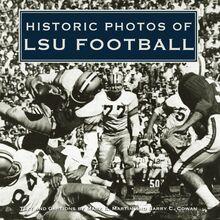Historic Photos of Dwight D. Eisenhower , livre ebook
170
pages
English
Ebooks
2007
Vous pourrez modifier la taille du texte de cet ouvrage
Obtenez un accès à la bibliothèque pour le consulter en ligne En savoir plus
Découvre YouScribe en t'inscrivant gratuitement
Découvre YouScribe en t'inscrivant gratuitement
170
pages
English
Ebooks
2007
Vous pourrez modifier la taille du texte de cet ouvrage
Obtenez un accès à la bibliothèque pour le consulter en ligne En savoir plus
Publié par
Date de parution
01 novembre 2007
Nombre de lectures
3
EAN13
9781618586247
Langue
English
Poids de l'ouvrage
2 Mo
Dwight David Eisenhower is famous as both a soldier and as a statesman. Like George Washington and Ulysses S. Grant, Eisenhower the soldier commanded large American military forces and helped win a war that threatened his nation, and then served his country as president.
Dwight Eisenhower's life is also the archetypal American story of the poor boy who rises as far as his talents and abilities enable him. I like Ike"" became a campaign slogan long after it was used to express the feelings of many of the people who met him in school, worked with, or served under him.
This book, Historic Photos of Dwight D. Eisenhower, chronicles Eisenhower's amazing life in nearly two hundred photographs. These images and text help explain why another president said, "America will always be a better nation . . . because Ike was with us when America needed him."
Publié par
Date de parution
01 novembre 2007
Nombre de lectures
3
EAN13
9781618586247
Langue
English
Poids de l'ouvrage
2 Mo
Turner Publishing Company 200 4th Avenue North • Suite 950 Nashville, Tennessee 37219 (615) 255-2665
www.turnerpublishing.com
Historic Photos of Dwight D. Eisenhower
Copyright © 2007 Turner Publishing Company
All rights reserved. This book or any part thereof may not be reproduced or transmitted in any form or by any means, electronic or mechanical, including photocopying, recording, or by any information storage and retrieval system, without permission in writing from the publisher.
Library of Congress Control Number: 2007929606
9781618586247
Printed in the United States of America
07 08 09 10 11 12 13 14—0 9 8 7 6 5 4 3 2 1
Table of Contents
Title Page Copyright Page ACKNOWLEDGMENTS Dedication PREFACE THE SON OF PACIFISTS BECOMES A SOLDIER LEADER OF THE GREAT CRUSADE LEADER OF THE FREE WORLD AN AMERICAN HERO NOTES ON THE PHOTOGRAPHS
Before General (four stars) Dwight D. Eisenhower arrived in England to direct the invasion of France, he returned to America for some rest from stress and fatigue, and a reunion with his family after eighteen months. His wife, Mamie, noticed that he was visibly overweight and smoked constantly. Meetings with George Marshall and President Roosevelt interrupted what little time Ike and Mamie had together. When he left on January 15, 1944, he would not see her again for another eighteen months.
ACKNOWLEDGMENTS
This volume, Historic Photos of Dwight D. Eisenhower, is the result of the cooperation and efforts of a number of organizations and individuals.
We would like to thank in particular the Dwight D. Eisenhower Presidential Library & Museum. Special thanks to Bill Jaffe for his determined research work, and to T. P. Schweider, David Parham, and Carlo D’Este for their help confirming key facts.
for
Anne and Iggy
who help me chase my dreams
—Dana Lombardy, Author
PREFACE
Dwight David Eisenhower is famous both as a soldier and as a statesman. Like George Washington and Ulysses S. Grant, Eisenhower the soldier commanded large American military forces and helped win a war that threatened his nation, and then served his country as president. Unlike Washington or Grant, however, President Eisenhower had to contend with another conflict, a Cold War, which in some ways was as perilous to the United States as World War II.
Dwight Eisenhower’s life is also the archetypal American story of the poor boy who rises as far as his talents and abilities enable him. “I like Ike,” became a campaign slogan long after it was used to express the feelings of many of the people who met him in school, worked with, or served under him.
Recognizing his intellect and capabilities, senior Army officers guided Ike into important staff positions, grooming him for higher command. Eisenhower’s capacity to learn quickly was essential to victory over Nazi Germany. These same skills enabled him as president to safely guide his country through a dangerous decade of confrontation with communist expansion.
What kind of man was Dwight David Eisenhower?
Dwight’s personality was formed by a combination of natural talents, personal experiences, and his family.
One of his most impressive qualities was Ike’s ability to remember almost everything he read or that was shown to him. Combined with his ability to listen well and ask pertinent questions, this talent served him well in both the Army and after.
He was a modest man whose self-confidence and intelligence enabled him to become a leader. Dwight Eisenhower learned to manage people with difficult personalities, even when it meant swallowing his pride. Ike could devise a clear plan and correct strategy, but was not afraid to change his mind when new information or facts required it.
Dwight’s father, David, was described as “stolid” and the opposite of his mother, whose personality was outgoing. David worked twelve-hour days and was the family disciplinarian. With his father absent so much, young Ike became friends with an older man, Bob Davis, who had time to teach Dwight fishing, hunting, and poker. Dwight became an expert poker player, an aptitude that later helped supplement his meager army pay. But it was a secret he kept from his family and Ike lost his temper with his young wife, Mamie, when she boasted about his skill to a visiting dignitary.
Religion made a mark on Dwight Eisenhower, but not in a typical way. His father David was apparently indifferent to his faith, the River Brethren sect of the Mennonites. After her baby Paul’s death in 1895, Dwight’s mother Ida became a Jehovah’s Witness. David converted to Ida’s new religion perhaps to placate his wife, but religion stopped being a part of his life about 1915, twenty-seven years before his death. Although their sons were sent to Sunday school, Ike’s parents never demanded strict church observance from their boys.
Until he became president, Dwight Eisenhower never attended church. None of the Eisenhower boys followed the beliefs of their parents, but they were all affected by their religious upbringing. By the time he left for West Point in 1911, Dwight had read the entire Bible twice and amazed colleagues during World War II by quoting from memory a suitable passage for any occasion.
Except for his older brother Edgar, with whom Dwight had a lifelong rivalry, he got along well with his five brothers but saw them infrequently as an adult. The one thing they all agreed on was leaving their small hometown of Abilene, Kansas, and escaping their father’s fate.
Ike inherited his father’s violent temper. His boyhood rages were legendary, and as an adult he would surprise people with an outburst from a face suddenly flushed red. One such incident occurred when he visited his hometown in 1947. Upon seeing a sign in front of the house that announced it was the boyhood home of General Eisenhower, Ike exploded. This was the home of the entire Eisenhower family, and he demanded that the sign be changed immediately. The next day, it was.
Dwight venerated his mother, Ida, whom he credits with teaching him to control his temper. Her religious affiliation was a source of embarrassment, however, and Ike rarely spoke about it. Except for this aspect of her life, Ida was considered the glue that held the family together, and her influence upon her sons was tremendous. General Eisenhower wrote in March 1942, four years before her death, “I think my mother is the finest person I’ve ever known.”
Both parents instilled in their six sons a certain independence and determination to rise above their humble origins. All of them did, but Dwight Eisenhower exceeded all expectations to become, as one historian aptly describes him, “an amazing man.”
Finally ordered to France, Ike was still in America when World War I ended. A frustrated Eisenhower told a classmate, “I suppose we’ll spend the rest of our lives explaining why we didn’t get into this war.” The army was quickly trimmed in size and Ike reverted to the rank of captain in June 1920. Here he stands next to a French Renault FT-17 tank at the Tank Corps’ new home at Fort Meade, Maryland.
THE SON OF PACIFISTS BECOMES A SOLDIER
(1890–1932)
It is ironic that Dwight Eisenhower led armies against Germany. Two hundred years earlier, Dwight’s ancestors became pacifists and left their German homeland to escape the wars that periodically spread across Europe.
Hans Nicholas Eisenhauer (“iron cutter” in German) arrived in America in 1741. In the 1800s the spelling changed to Eisenhower. Four generations of successful farmers followed Hans, including his great grandson, Jacob, the grandfather of Dwight Eisenhower. Some Eisenhowers served in the Union army during the Civil War, but Jacob and many other Mennonite pacifists did not fight.
Jacob’s eldest surviving son, David (Dwight’s father), was born in 1863. Fourteen years later Jacob moved his family to Kansas from Pennsylvania. Farming did not appeal to David and he attended Lane University where he studied Greek and mathematics, and met his future wife, a “vivacious” young woman named Ida Elizabeth Stover.
Ignoring contemporary opinions that higher education for women was unnecessary and unladylike, at the age of twenty-one Ida used part of her inheritance to enroll in Lane University to study her passion, music. There she met David Jacob Eisenhower whose personality was described as opposite her witty and outgoing temperament. Perhaps Ida was attracted to David’s intellect for she married him on his twenty-second birthday, September 23, 1885.
The young couple quit school and David became a partner in a store. He eventually lost interest in that business and found work in Denison, Texas, where their third son, David Dwight Eisenhower, was born on October 14, 1890. Things did not go well in Texas, and the family moved to Abilene, Kansas, in 1892 where David got a job at the Belle Springs Creamery.
David struggled financially, but despite their poverty his six surviving sons grew up relatively happy in an idyllic rural environment. Dwight David (as his mother unofficially renamed him) loved baseball and other sports, swimming, fishing, and hunting.
After graduation from high school in 1909, Dwight worked at various jobs to help his brother Edgar pay for college. A friend suggested he further his own education at one of the military academies. Ike did well on the entrance exams and was recommended to West Point—although he hoped to attend the naval academy at Annapolis. Dwight’s mother was disappointed. She believed that war was “wicked,” but she kept silence. After Dwight left she cried.
First known photograph of Dwight Eisenhower, age three, with his brothers, 1893. Arthur is holding Roy, while Edgar is standing behind Dwight. In 1894 a fifth son, Paul, was born but died from diphtheria in 1895. Two more boys followed: Earl, in 1898, and Milton, in 1899. David and Ida were disappointed that they never produced a girl.
A view of downtown Abilene, Ka














